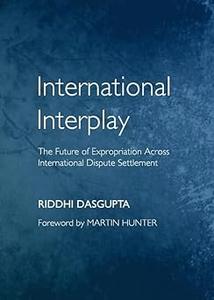- Joined
- Jul 3, 2023
- Messages
- 42,413
- Reaction score
- 1
- Points
- 38

Free Download Riddhi Dasgupta, "International Interplay: The Future of Expropriation Across International Dispute Settlement"
English | ISBN: 1443845973 | 2013 | 480 pages | PDF | 2 MB
Are international tribunals heading towards greater sovereignty or towards greater liberalisation of property rights? Can we glean specific deductions from prevailing cases outside the expropriation arena? How can we justifiably extrapolate principles from international investment arbitration before modifying and applying these lessons to international human rights, the World Trade Organization regime and other dispute settlement systems? What, if any, degree of deference attends the assessment of various claims undertaken by international tribunals? Does this depend on high commerce, force majeure, military or paramilitary control, urgent nuclear and environmental considerations, transboundary harms, political instability, fraud and deception or other special circumstances? Where do textually strict treaty interpretations end and the general principles of international law take over? Can autonomous treaty interpretation by international tribunals be reconciled with the host State s prerogative of defining its own protected public interests? Where is the tipping point, too frequently fraught with the potential to deprive States of the incentive to stay within the applicable international compact? These issues must be comparatively addressed. Contemporary international law developments and dislocations are occurring at a break-neck pace. We pause and contemplate the implications. Riddhi Dasgupta analyses the standards of Expropriation, Exhaustion of Local Remedies, Continuous Nationality, Non-Discrimination (National Treatment, Most Favoured Nation and Domestic Discrimination), Fair and Equitable Treatment, Minimum Standard of Treatment, and Compensation across international dispute settlement. The foundational and evolving concept of consent is required to justify all public international law, from genesis onwards. The potency of expropriation-based claims will continue to expand, and the comparative lessons drawn from various international law regimes will interplay to stirring effect. Writing accessibly, Dasgupta proposes various legal strategies going forward and makes analytical prognostications about this area of international law. Dasgupta presents influential interview and anecdotal results as well as statistics concerning the growing flow of investments in targeted jurisdictions and sectors. For the international lawyer s benefit, the final chapter condenses the book s tactical scenario-planning and advice. Institutional dialogues among tribunals as well as tribunal dialogues with politicians, investors, NGOs, and of course citizens (the ultimate boson) will assume absolutely indispensable significance. This will be the true tipping-point in the eye of the storm. Legitimacy, transparency, justice, efficiency and economy, candour, party autonomy, coherence, incentives, and the tense clash of interests reappear as the constant motifs in this important but relatively unknown saga. Studiedly neutral in its orientation, this book strives to promote constructive solutions as well as public awareness.
Read more
Buy Premium From My Links To Get Resumable Support and Max Speed
Rapidgator
ececr.rar.html
NitroFlare
ececr.rar
Uploadgig
ececr.rar
Fikper
Links are Interchangeable - Single Extraction



